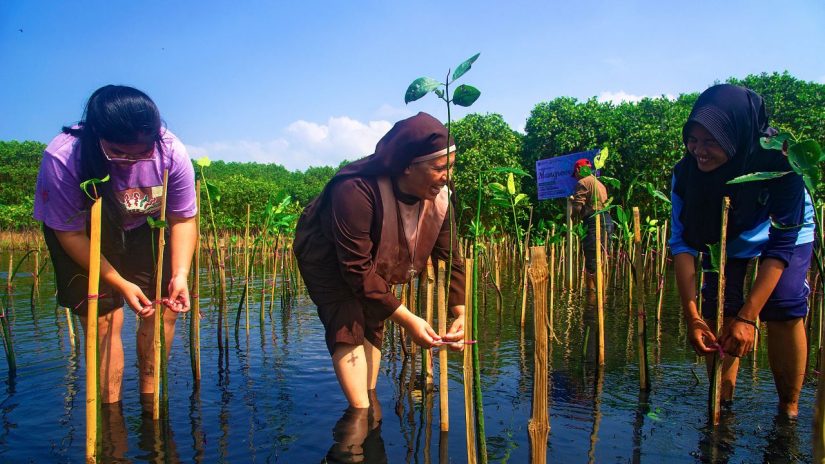
Athanasia Safitri
Socio-ecological crises occur inevitably in the small islands of Indonesia. The condition is sometimes not addressed properly by government policy. Underestimating the problem, along with continuous abuse of the land, will eventually harm the earth. It also affects social relationships among the state, the private sector, and the community involved. Approaches have been taken to tackle the problem, including from the perspective of religions.
These issues were discussed during a webinar held by Magister Sosiologi Agama of IAIN Ambon on December 18, 2024, titled Understanding Socio-ecological Crisis of the Small Islands with the Perspective of Religions and Ecology. Mega Rizky Sia of KORA Maluku presented the socio-ecological crisis in the Moluccas islands, Dr. Zainal Bagir of ICRS UGM shared his insights on the relation between religions and environment recovery, while Dr. Saidan Ernas of IAIN Ambon offered Islamic ecotheology to safeguard the nature.
Human-centered way of life
Anthropocentrism puts humans as the center of the universe thus it leads to over-exploitation of the earth and other beings for human benefits. Sia in her talk claims that most crises in Molucca happen as a result of the state policies in meeting the needs of the global market. The government projects with the private sector create changes in the socio-ecological system. Among the triggers are the implementation of six corridors for Indonesian economic development, the false location for forest areas, and minings.
Conflicts arise and change the nature of the social relations in that community, diminish socio-ecological knowledge in the young generation, and even create a shift in basic food production. To avoid increasing crises and to ensure people’s life longevity, Sia suggests more awareness of people’s productivity and continuity of ecological services. It is also important to have knowledge about the values, views, and practices to handle ecology crises.
Bagir also discusses the danger of prioritizing human benefits in the second webinar talk. Bagir highlights that anthropocentrism is marked by the drastic ecological changes due to human behavior which contribute to the ecological crisis. Human attitude affecting the earth has a much bigger scale in the ocean, land, and air which leads to global climate change that brings more impacts, not to mention the local changes due to false government policy and private sectors.
He proposes that ecological crises can be stopped if there are changes in the religious tradition. More international conferences now are held to understand how particular religious traditions, including those of the indigenous religions, respond to ecological crises. In Indonesia however, studies mostly are dominated by normative arguments about the theory and policy, without much views on the practices. Bagir adds that when there is any, it only focuses on the perspective of the main religious groups.
Islamic approach to respond to the crises
Bagir proposes that an approach can be taken from the practice of everyday religion and how the Muslim understands an issue. Shift in everyday religion makes use of the ethnography perspective and figures out how Muslims address and handle ecological issues. Most environmental NGOs and communities use local wisdom as an approach to fight against the ecological crisis, as seen in the case of the Citarum River.
The main goal is to change personal behaviors and organizational attitudes, to be in favor of not only environmental conservation but also ecological justice. Movement, as Bagir explains, can start from particular religious groups, non-structural ones which lead to local communities. It includes the projects of green Mosque, green Church, eco-pesantren, social justice, and environment. These efforts need to be made since ecological conditions and human behaviors, either secular or religious, connect with each other.
Ernas during the last talk of the session argues that Muslims’ lack of awareness to safeguard nature today has a connection with at least two points. One is the partial understanding of Islamic teachings in seeing that religious tradition only deals with rituals and not so much with social responsibilities including the caring of the environment. The second point is that there have been other social problems such as poverty and education where social ecological crisis is not viewed as an urgent issue to be taken care of. Ernas suggests that religious leaders should be approached accordingly to build awareness toward environmental conservation. It is expected that they will eventually invite their followers to do so.
Concrete actions
Bagir invites more alternative approaches to handle crises in the socio-ecological system. For study and research, there should be practices to relive local knowledge and wisdom. As for religious movements, hybridity must be encouraged for their collaboration with the state, local community, and secular ecological movement. Religious creativity is also needed to produce textual and theological arguments in line with scientific and practical contexts.
People should be open-minded and admit that sometimes religion can be ambiguous and instead harm nature. The goal of religion and ecology may collide therefore it needs communion of ideas and practices so each party can learn together. It is also important to keep in mind that religious teachings and rituals can be different from one another so inclusivity is vital to accommodate the existence of indigenous or minority religions.
